TOP 10 industrial vacuum cleaners: best models + tips for potential buyers
Professional construction or industrial vacuum cleaners are used for cleaning premises after renovation, for cleaning large production workshops, as well as in the work of cleaning companies. Their distinctive features are high performance and the presence of powerful filters that retain dust particles of any origin.
Such units are presented in the product lines of various manufacturers. Agree, the variety of offers makes the choice somewhat difficult. Which vacuum cleaner should you choose? We will help you choose the optimal device.
The article presents the ten best models, identifies their operating parameters, functionality, and describes the advantages and disadvantages identified by users. In addition, we have indicated the main technical criteria that should definitely be taken into account when purchasing industrial cleaning equipment.
The content of the article:
- Top ten models
- Place No. 1 - Soyuz PSS-7320
- Place No. 2 - Elitech PS 1235A
- Place #3 - Metabo AS 20L
- Place No. 4 - Kärcher NT 35/1 Tact BS
- Place No. 5 - Dastprom PP-220/20.3-1.5
- Place No. 6 - Messer DE 25
- Place No. 7 - Dastprom PP-220/52.3-3-S2
- Place #8 - Ghibli AS 40 KS
- Place #9 - Blizzard S500DE
- Place #10 - Ghibli Power InDust AX 60 TP Z22
- Main selection criteria
- Conclusions and useful video on the topic
Top ten models
Using a vacuum cleaner, you can perform dry and wet cleaning, and collect debris after an explosion or fire. There are also models designed for collecting hot waste.
These devices are used both during work and for final cleaning of surfaces.
Experts divide such vacuum cleaners into two types:
- industrial industrial vacuum cleaners, which are designed for continuous cleaning of large areas and have tanks up to 125 liters;
- household industrial - for carrying out small work, because their volume of dirt tanks does not exceed 70 liters.
Industrial devices differ from conventional ones by having a more powerful motor. Their main task is not only to clean the room from debris, but also to cleanse the dust floating in the air.
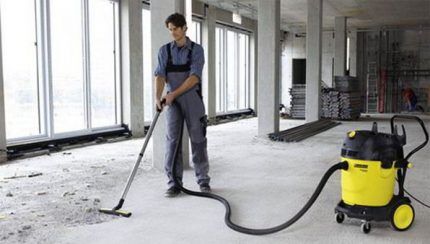
Such dust can be explosive or flammable, it can contain fungal spores, harmful microparticles, in other words, it can cause allergies or difficulties in the functioning of the respiratory system.
Our rating includes some of the best industrial models, arranged in ascending order of price. After familiarizing yourself with it, everyone will choose the right model for themselves.
Place No. 1 - Soyuz PSS-7320
The suction power of this unit is at least 1600 W. But it consumes no more than 2000 W of energy. Suitable for wet and dry cleaning in production, in workshops and workshops.
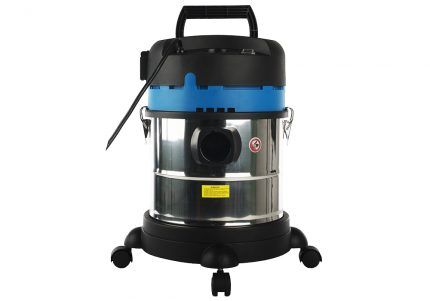
Characteristics:
- volume - 20 l;
- device height - 60 cm;
- hose length - 1.5 m;
- cord length - 3 m;
- weight - 5.2 kg;
- additionally - 3 spare paper garbage bags.
Among the minuses, it is worth noting the lack of a cooling system, which does not allow the device to be used continuously for a long time, and a short hose for cleaning.
Place No. 2 - Elitech PS 1235A
Great a budget option for cleaning after renovation work in a small room.Under the casing there is a powerful motor that consumes energy with a power of 1200 W.
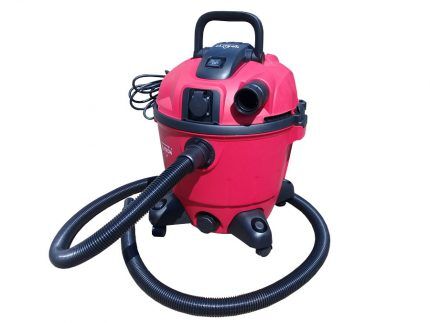
Characteristics:
- type of dust collector - bag + container;
- volume - 35 l;
- weight - 9.3 kg;
- device height - 57 cm;
- cord length - 5 m;
- hose length - 3 m;
- additionally - 4 nozzles.
Users consider one of the main advantages long hose and cable, the kit includes disposable paper trash bags.
Place #3 - Metabo AS 20L
Small dimensions allow the device to do an excellent job of cleaning even the smallest rooms. The device has industrial approval.
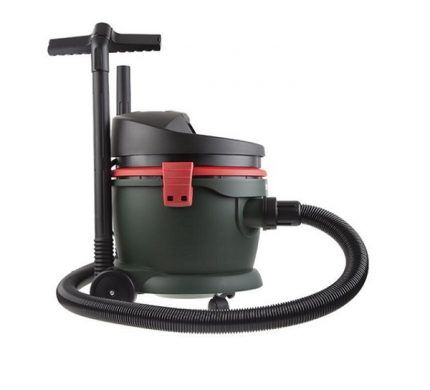
Characteristics:
- type of dust collector - container;
- volume - 20 l;
- device height - 58 cm;
- hose length - 1.75 m;
- cord length - 5 m;
- weight - 5 kg;
- additionally - 2 special nozzles and 2 working pipes.
Users love that there is a separate place to store all the accessories and device mobility.
Among the disadvantages, many mentioned that the device can turn itself off if the garbage tank is completely filled during wet cleaning and you need to spend time cleaning it.
Place No. 4 - Kärcher NT 35/1 Tact BS
This vacuum cleaner is recommended to be used for cleaning bakeries and food drying chambers, as well as for cleaning dry and wet waste in other industrial premises. It is easy to transport due to its light weight and dimensions.
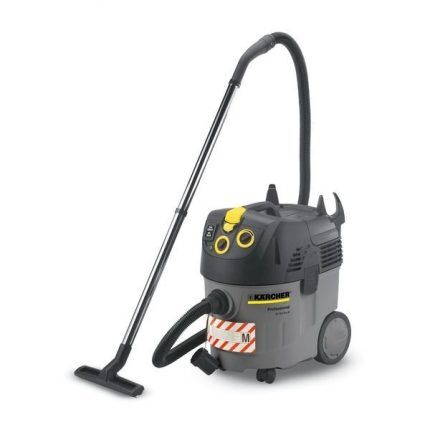
Characteristics:
- type of dust collector - bag;
- volume - 35 l;
- device height 51.7 cm;
- cord length - 7.5 m;
- hose length - 3 m;
- nozzles - 4 pieces;
- weight - 12.8 kg;
- Additionally, there is a sophisticated filter cleaning system and storage space for accessories.
One of the main advantages of the device is considered by its owners to be the presence automatic filter cleaning, good suction power, as well as a separate place for storing attachments and cord.
Some users called the plastic container a minus.
The German brand has many productive and reliable construction vacuum cleaners in its arsenal. You can see the top ten best offers at this review.
Place No. 5 - Dastprom PP-220/20.3-1.5
Great for cleaning mixed dirt over large areas. It will clean any surfaces from dust, because the suction power is at least 500 W. But the power consumption reaches 1500 W.
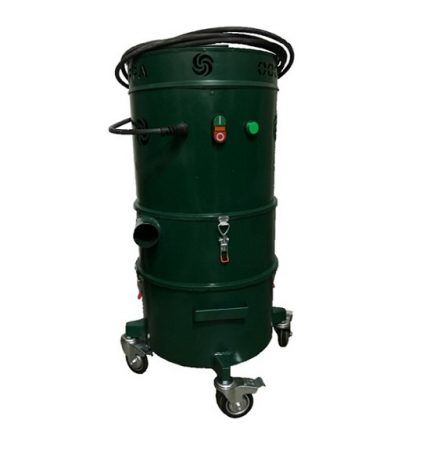
Characteristics:
- volume - 20 l;
- device height - 89 cm;
- hose length - 5 m;
- cord length - 3 m;
- weight - 17.4 kg;
- additionally - 5 different nozzles and other accessories, as well as 2 cyclone tanks.
Among the disadvantages, users point out that the device is not suitable for collecting fine dust.
Place No. 6 - Messer DE 25
Perfect for medium-sized construction projects, as well as for cleaning before and during repair and construction work.
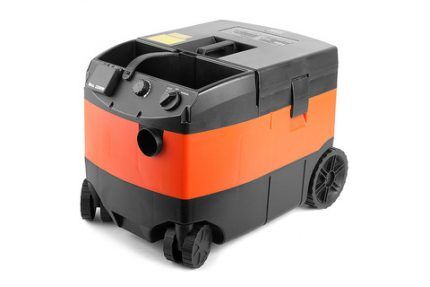
Characteristics:
- type of dust collector - bag;
- volume - 25 l;
- device height 45.8 cm;
- hose length - 4 m;
- cord length - 4 m;
- weight - 12 kg;
- additionally - an electromagnetic vibration system for mechanical cleaning of filters.
Among the advantages, users highlight the presence of a belt for securing the working hose and a stable design on wheels. The vacuum cleaner is very easy to use.
The main disadvantage is the fabric bag for collecting waste.
Place No. 7 - Dastprom PP-220/52.3-3-S2
The domestic cleaning apparatus is most often used in production, in workshops for dry or wet cleaning.
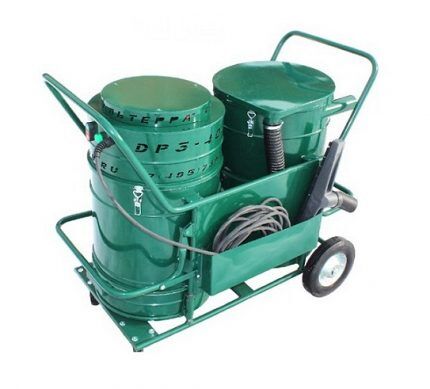
Characteristics:
- type of dust collector - container;
- volume - 52 l;
- filter systems - 3 stages;
- device height - 89 cm;
- hose length - 5 m;
- weight - 59 kg;
- additionally - 7 different attachments for thorough cleaning.
The owners of the unit are satisfied overheat protection system, which allows you to work for a long time without having to shut down. Among the disadvantages, it is worth mentioning the large weight and dimensions, but they are completely offset by the excellent technical characteristics.
Place #8 - Ghibli AS 40 KS
This model can be applied for professional cleaning construction sites, auto repair shops, food and industrial facilities. The vacuum cleaner can cope with long-term continuous operation.
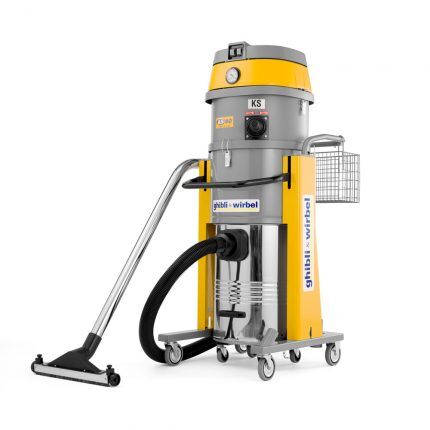
Characteristics:
- type of dust collector - container;
- volume - 40 l;
- device height - 146 cm;
- hose length - 3 m;
- weight - 51 kg;
- additionally - 3 powerful turbines.
Besides everything else, a pressure gauge is provided, thanks to which the user can analyze the state of the filtration system. There is a separate basket on the body for brushes and attachments.
Among the advantages, users highlight the convenient design on wheels, thanks to which the vacuum cleaner is easy to move, as well as presence of three suction turbines. One of the disadvantages is the short hose, but 10 meters of cord, to some extent, eliminates this problem.
Place #9 - Blizzard S500DE
Will do for large enterprises and workshops, as it can work without interruption for a long time. The device is designed to clean an area of 300 square meters. Its dust suction power is 600 W. And the power consumption is about 1500 W.
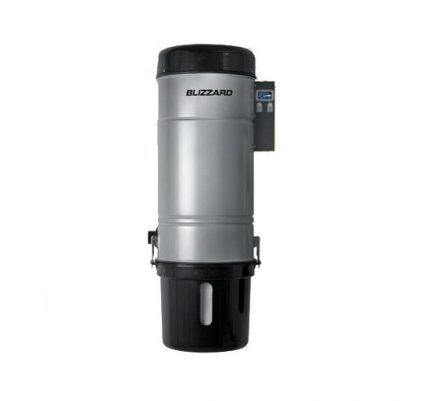
Characteristics:
- dust collector type - hybrid cyclone;
- volume - 20 l;
- device height - 60 cm;
- hose length - 1.5 m;
- weight - 51 kg;
- additionally - a noise silencer and an air inlet.
Among the disadvantages, owners point out the high cost, so the device is ideal only for large companies.
Place #10 - Ghibli Power InDust AX 60 TP Z22
Professional three-phase device Designed for cleaning dust class M And ATEX. The absence of a gearbox makes the vacuum cleaner almost silent and extremely powerful, and also makes it possible to use it continuously (up to a day).
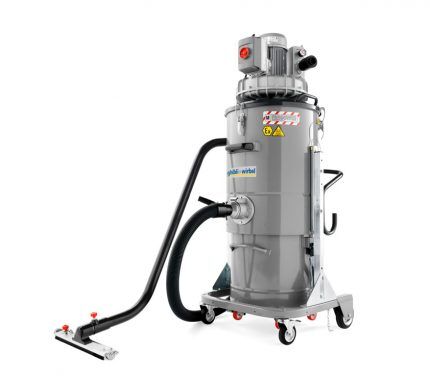
Characteristics:
- tank volume - 60 l;
- nozzles - purchased separately;
- filter system for working with different types of dust;
- device height - 140 cm;
- hose length - not specified;
- weight - 80 kg;
- additionally - electronic balancing of the turbine, vacuum sensor.
Among the advantages it is worth highlighting noiselessness, power, work with all types of dust. Some users cite the high price, heavy weight, and the fact that all attachments must be purchased independently as a disadvantage.
Our rating covers a wide variety of models. Be sure to read the documents for the device and check the warranty to avoid unpleasant situations.
Main selection criteria
Before purchasing an industrial vacuum cleaner, make a list of the functions that the working device should perform. After this, it will be easier to choose the right model, and you will not overpay for unnecessary options.
Dust class and dust container type
Knowing the class of dust and dirt is very important. The class of the vacuum cleaner depends on what kind of dust needs to be collected. Next, we will look at the main designations that can be found in the instructions for cleaning equipment.
Decoding letter markers:
- L – the device is used for dry cleaning of ordinary dust - low-hazard. For example, from clay, concrete, paint, varnish, etc.
- M – the device copes with wood and concrete debris - medium hazard class. Devices with this class are also used for cleaning at power plants.
- H – the unit cleans from highly hazardous dust with pathogenic and allergenic bacteria. For example, fungus, microbes, fertilizers, caustic dyes.
- ATEX– a vacuum cleaner is used to clean explosive and flammable dirt – the highest hazard class.
Waste with a high degree of fire hazard can only be removed by special industrial devices.
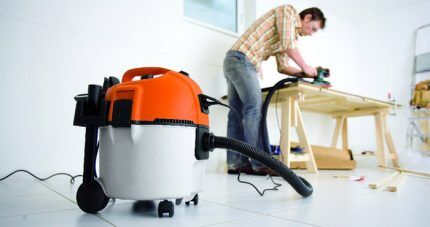
Depending on the purpose for which the equipment is needed, the type of dust collector is selected.So, among the most common are the following types.
Fabric bag. It is reusable, so accumulated debris must be shaken out. They are made from thick non-woven fabric. If the fabric is double or specially impregnated, then it can trap even fine dust; if another fabric is used, then only large particles.
Paper disposable bags You can throw them away after filling them and you won't have to come into contact with dust. They collect dust particles no smaller than 0.3 microns in size.
You should not collect debris in such bags that can damage them, such as glass, stones, fragments of materials, etc., otherwise debris may get into the engine, which will lead to breakdown.
Containers used in units with cyclone filter. They are easy to clean, but, unfortunately, such models are noisier. They are perfect for large industrial waste, liquid mud and water.
The rating of the best construction models without a bag is presented in this article.
Experts recommend using a bag in addition to the container, because in this way you can extend the life of the main filter and collect fine dust.
Aquafilter is considered the most effective, because it “picks up” even the smallest dust and is not afraid of large waste and glass. However, such filters are not installed on large vacuum cleaners.
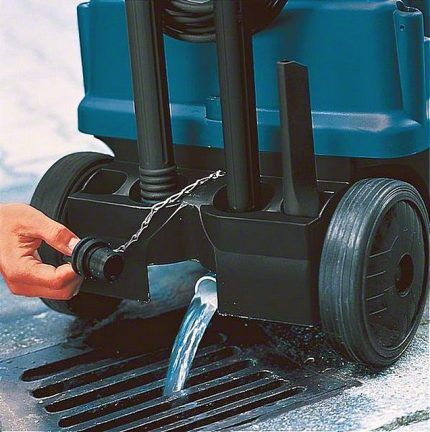
Filter system. In most of these vacuum cleaners you can find fine filters, a cyclone system, or aqua filters. There are many types of them on the modern market.
Simpler vacuum cleaners are equipped with a manual cleaning system, that is, one that is carried out by the user himself. The filter must be carefully pulled out, cleaned with a brush and/or water, dried and replaced.
Most modern models have an intelligent system that itself regulates the degree of pollution. Such a system can be fully automatic or semi-automatic.
The latter is connected when the owner presses a button and the filter is affected by special high-frequency vibrations. In some models, manufacturers have added directed air flow to this purification.
Auto-cleaning occurs in exactly the same way, only without user intervention. This will make it possible not to clean the filters after each use.
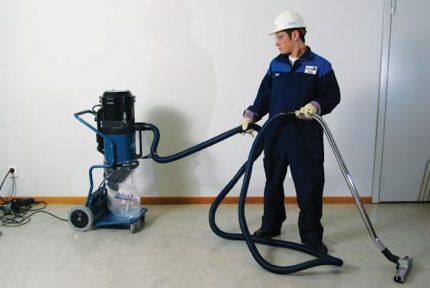
The system itself is installed above the filter in the form of a special valve that regulates air flow. They are the ones who clean the filter from debris and dirt.
This valve is activated both automatically and manually. The presence of such a system increases the price, but if the device is used frequently, it will quickly pay for itself and save time.
Design and power of equipment
As a rule, the steel body is coated with a special durable paint. The device protected in this way receives additional noise insulation.
Also, the method of movement also plays an important role, because industrial units are quite heavy.
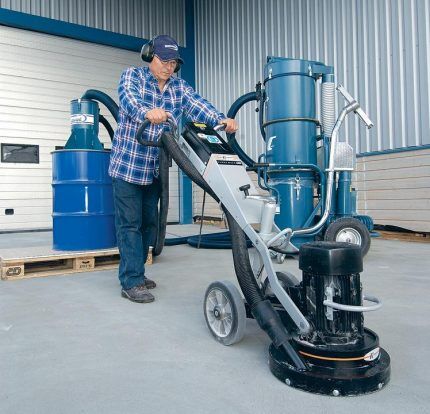
The dimensions and, to a certain extent, the amount of garbage collected depend on the volume of the container and dust collector.
If we talk about suction power, then a number exceeding 400 W is considered optimal. The higher the indicator, the better the quality of cleaning. Please note that before purchasing, you should check whether the electrical network can withstand the high load.
The cleaning efficiency depends on the capabilities of the motor. If you need a device for cleaning small spaces and non-hazardous dust, then focus on the figure from 2 kW.
If there is a need for an industrial model that will uninterruptedly clean large surfaces, then the power should be more than 3 kW.
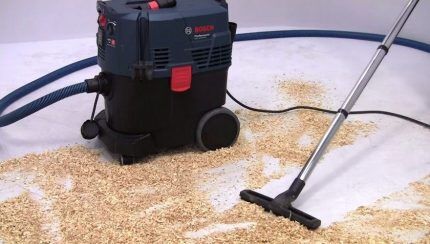
There are vacuum cleaners with two or three motors, which allows for less wear and tear on the mechanism. There are three-phase models and those that run on battery power. The latter are limited by battery life.
Motor washers are equipped with air insulation to prevent moisture from reaching live parts. Graphite brushes fail much faster than the engine they are part of. Therefore they must be checked and replaced if necessary.
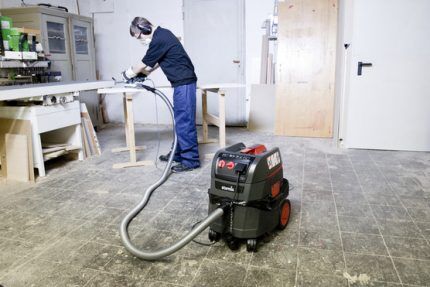
Based on these basic technical indicators, you can easily select a suitable industrial vacuum cleaner.
Additional equipment characteristics
Most often, additional functions do not affect the quality of cleaning, but make life much easier for users.Let's consider the most significant of them.
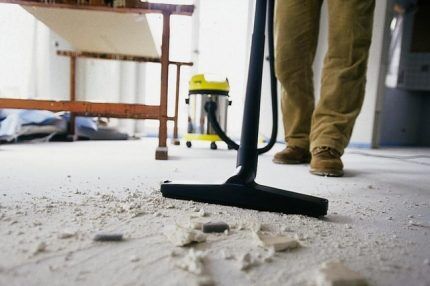
Some models have a separate socket on the body for connecting power tools. This allows you not to be distracted while performing complex work.
Special adapters and splitters are also useful, thanks to which you can simultaneously connect several dust-generating devices or hoses. Especially if there is a need to connect devices from other manufacturers to the vacuum cleaner.
When choosing the right model, also pay attention to the length of the hose and what material it is made of.
It is worth paying attention to protecting the engine from overheating if the device is used in large workshops or in production. If there are power surges in your area, you should install a fuse or relay to prevent expensive equipment from breaking down.
Thanks to the vacuum control function, users have the ability to change the suction strength by controlling the pressure.
Light notification about the filling of dust collectors, the condition of the motor, filters, and possible breakdown will also be a nice addition.
If you purchase a washing device or a combined device (wet + dry cleaning), then pay attention to the drain neck. Now, to clean the tank with dirty water, you just need to unscrew the drain and drain the water.
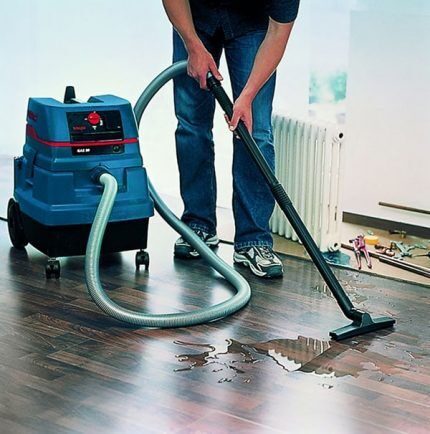
Whatever device you choose, remember that any equipment needs timely cleaning and careful maintenance.
Conclusions and useful video on the topic
Tips for choosing industrial vacuum cleaner models:
Any vacuum cleaner for industry will provide: comfortable and safe conditions both in a large workshop and in a small room, since it will quickly cope with harmful dust; there is no danger of ignition of debris particles due to sparks from electrical appliances. In addition, it will save time on cleaning.
What type of vacuum cleaner do you prefer? Or are you just planning to purchase an industrial cleaning unit? Please share your experience of choosing and impressions of using the equipment. Leave comments, ask questions, add product reviews and tips for buyers - the contact form is located below.
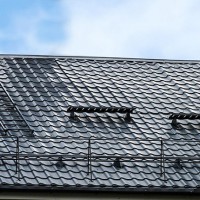

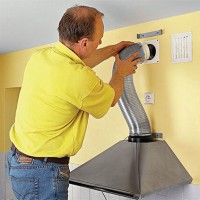
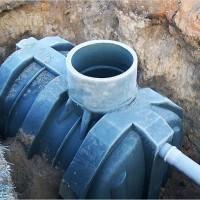
We have been doing turnkey repairs for a long time, and an industrial vacuum cleaner was simply a necessity for us. Without it, you will not be able to deliver the object in the required condition. We bought Kärcher, I trust this equipment. In terms of price, it is, of course, one of the most affordable for industrial vacuum cleaners. Almost 30 thousand rubles, but I am confident in this vacuum cleaner, it will not let you down at a crucial moment. Cleans perfectly, suitable for both dry and wet cleaning. And for 300 thousand, let them buy large production facilities, we cannot handle this.
I am familiar with the Soyuz brand firsthand; I have many tools of this brand in my workshop. But their vacuum cleaners are not the best quality. True, I don’t have this top model. But as I later learned from friends, all the manufacturer’s models have one problem: bad filters. And their equipment suffers. The hose is short, I had to change it. I’m using it for now, but soon I’m thinking of buying another vacuum cleaner, but definitely from a different company. I don't recommend this to anyone.
Dastprom is a bucket of nuts.They just threw it away. But first the money. There are no Nilfisk and Hilti in the review - this is amazing.
The review shows mainly construction, rather than industrial, vacuum cleaners! The review does not include manufacturers such as Nilfisk and Coynco.